七年级报纸电子版·深圳版(第15期)
七年级报纸电子版·深圳版(第16期)
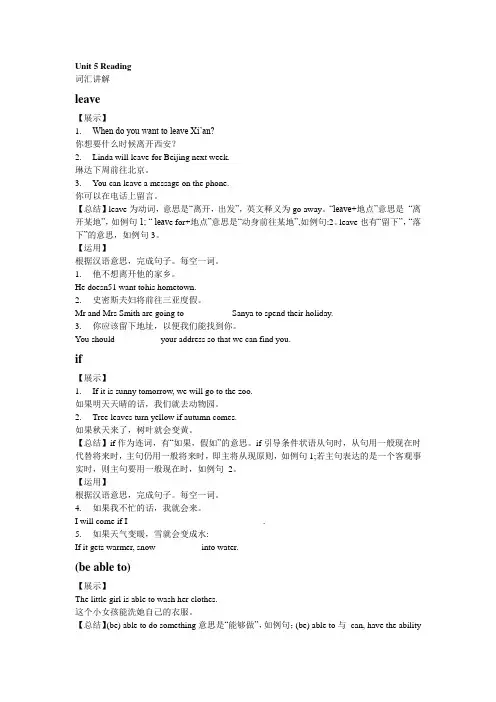
Unit 5 Reading词汇讲解leave【展示】1. When do you want to leave Xi’an?你想要什么时候离开西安?2. Linda will leave for Beijing next week.琳达下周前往北京。
3. You can leave a message on the phone.你可以在电话上留言。
【总结】leave为动词,意思是“离开,出发”,英文释义为go away。
“leave+地点”意思是“离开某地”,如例句1; “ leav e for+地点”意思是“动身前往某地”,如例句:2。
leave也有“留下”,“落下”的意思,如例句3。
【运用】根据汉语意思,完成句子。
每空一词。
1. 他不想离开他的家乡。
He doesn51 want to h is hometown.2. 史密斯夫妇将前往三亚度假。
Mr and Mrs Smith are going to __________ Sanya to spend their holiday.3. 你应该留下地址,以便我们能找到你。
You should__________ your address so that we can find you.if【展示】1. If it is sunny tomorrow, we will go to the zoo.如果明天天晴的话,我们就去动物园。
2. Tree leaves turn yellow if autumn comes.如果秋天来了,树叶就会变黄。
【总结】if作为连词,有“如果,假如”的意思。
if引导条件状语从句时,从句用一般现在时代替将来时,主句仍用一般将来时,即主将从现原则,如例句1;若主句表达的是一个客观事实时,则主句要用一般现在时,如例句2。
【运用】根据汉语意思,完成句子。
每空一词。
4. 如果我不忙的话,我就会来。
I will come if I__________ __________ __________.5. 如果天气变暖,雪就会变成水:If it gets warmer, snow__________ into water.(be able to)【展示】The little girl is able to wash her clothes.这个小女孩能洗她自己的衣服。
七年级报纸电子版·深圳版(第10期)
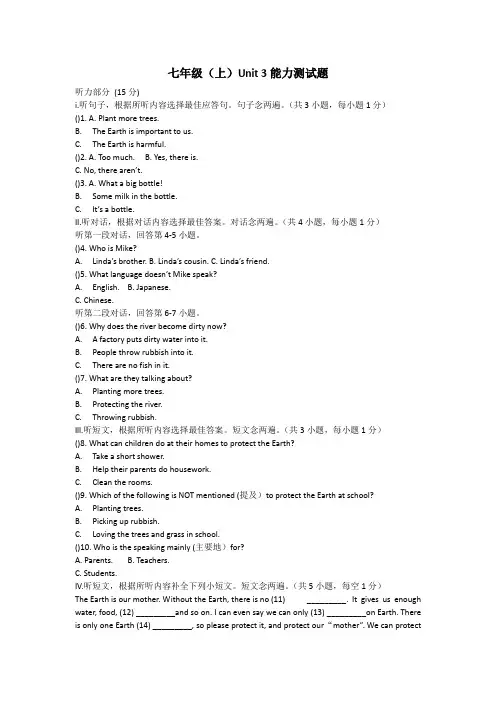
七年级(上)Unit 3能力测试题听力部分(15分)i.听句子,根据所听内容选择最佳应答句。
句子念两遍。
(共3小题,每小题1分)()1. A. Plant more trees.B. The Earth is important to us.C. The Earth is harmful.()2. A. Too much. B. Yes, there is.C. No, there aren’t.()3. A. What a big bottle!B. Some milk in the bottle.C. It’s a bottle.II.听对话,根据对话内容选择最佳答案。
对话念两遍。
(共4小题,每小题1分)听第一段对话,回答第4-5小题。
()4. Who is Mike?A. Linda’s brother.B. Linda’s cousin.C. Linda’s friend.()5. What language doesn’t Mike speak?A. English.B. Japanese.C. Chinese.听第二段对话,回答第6-7小题。
()6. Why does the river become dirty now?A. A factory puts dirty water into it.B. People throw rubbish into it.C. There are no fish in it.()7. What are they talking about?A. Planting more trees.B. Protecting the river.C. Throwing rubbish.Ill.听短文,根据所听内容选择最佳答案。
短文念两遍。
(共3小题,每小题1分)()8. What can children do at their homes to protect the Earth?A. Take a short shower.B. Help their parents do housework.C. Clean the rooms.()9. Which of the following is NOT mentioned (提及)to protect the Earth at school?A. Planting trees.B. Picking up rubbish.C. Loving the trees and grass in school.()10. Who is the speaking mainly (主要地)for?A. Parents.B. Teachers.C. Students.IV.听短文,根据所听内容补全下列小短文。
(学生双语报第15期)广东省深圳...
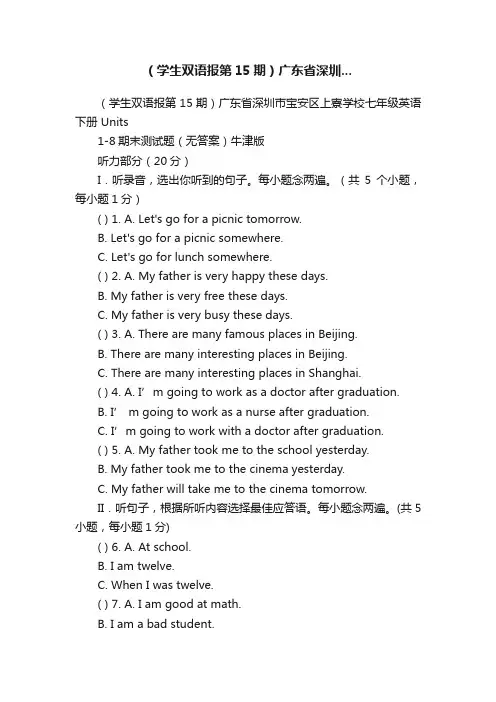
(学生双语报第15期)广东省深圳...(学生双语报第15期)广东省深圳市宝安区上寮学校七年级英语下册 Units1-8期末测试题(无答案)牛津版听力部分(20分)I.听录音,选出你听到的句子。
每小题念两遍。
(共5个小题,每小题1分)( ) 1. A. Let's go for a picnic tomorrow.B. Let's go for a picnic somewhere.C. Let's go for lunch somewhere.( ) 2. A. My father is very happy these days.B. My father is very free these days.C. My father is very busy these days.( ) 3. A. There are many famous places in Beijing.B. There are many interesting places in Beijing.C. There are many interesting places in Shanghai.( ) 4. A. I’m going to work as a doctor after graduation.B. I’ m going to work as a nurse after graduation.C. I’m going to work with a doctor after graduation.( ) 5. A. My father took me to the school yesterday.B. My father took me to the cinema yesterday.C. My father will take me to the cinema tomorrow.II.听句子,根据所听内容选择最佳应答语。
(2014春)七年级报纸电子版·牛津深圳版(第12期)
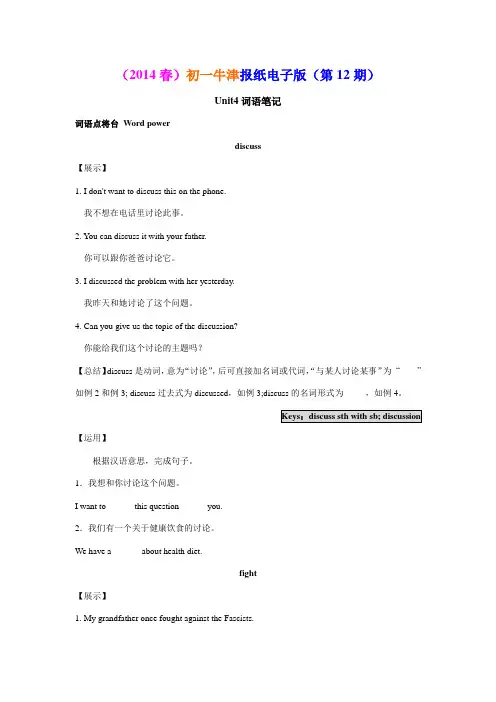
(2014春)初一牛津报纸电子版(第12期)Unit4词语笔记词语点将台Word powerdiscuss【展示】1. I don't want to discuss this on the phone.我不想在电话里讨论此事。
2. You can discuss it with your father.你可以跟你爸爸讨论它。
3. I discussed the problem with her yesterday.我昨天和她讨论了这个问题。
4. Can you give us the topic of the discussion?你能给我们这个讨论的主题吗?【总结】discuss是动词,意为“讨论”,后可直接加名词或代词,“与某人讨论某事”为“____”如例2和例3; discuss过去式为discussed,如例3;discuss的名词形式为_____,如例4。
Keys:discuss sth with sb; discussion 【运用】根据汉语意思,完成句子。
1.我想和你讨论这个问题。
I want to ______this question______ you.2.我们有一个关于健康饮食的讨论。
We have a ______ about health diet.fight【展示】1. My grandfather once fought against the Fascists.我的祖父曾经与法西斯分子作斗争。
2. We should fight against pollution.我们应该与污染作斗争。
【总结】fight为动词,意思是“与……作斗争”,后一般加介词______,如例1和例2。
fight 过去式为______.Keys: against; fought 【运用】根据汉语意思,完成句子。
3.很多人曾经与贫困作斗争。
Many people once ______ ______ poverty.4.我们必须与暴力作斗争。
七年级报纸电子版·深圳版(第4期)
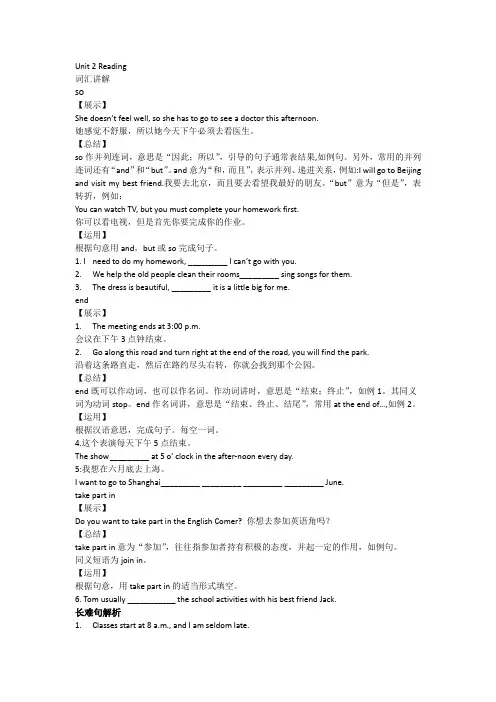
Unit 2 Reading词汇讲解so【展示】She doesn’t feel well, so she has to go to see a doctor this afternoon.她感觉不舒服,所以她今天下午必须去看医生。
【总结】so作并列连词,意思是“因此;所以”,引导的句子通常表结果,如例句。
另外,常用的并列连词还有“and”和“but”。
and意为“和,而且”,表示并列、递进关系,例如:I will go to Beijing and visit my best friend.我要去北京,而且要去看望我最好的朋友。
“but”意为“但是”,表转折,例如:You can watch TV, but you must complete your homework first.你可以看电视,但是首先你要完成你的作业。
【运用】根据句意用and,but或so完成句子。
1. I need to do my homework, _________ I can’t go with you.2. We help the old people clean their rooms_________ sing songs for them.3. The dress is beautiful, _________ it is a little big for me.end【展示】1. The meeting ends at 3:00 p.m.会议在下午3点钟结束。
2. Go along this road and turn right at the end of the road, you will find the park.沿着这条路直走,然后在路约尽头右转,你就会找到那个公园。
【总结】end既可以作动词,也可以作名词。
作动词讲时,意思是“结束;终止”,如例1。
其同义词为动词stop。
end作名词讲,意思是“结束、终止、结尾”,常用at the end o f…,如例2。
(2014春)七年级报纸电子版·牛津深圳版(第05期)
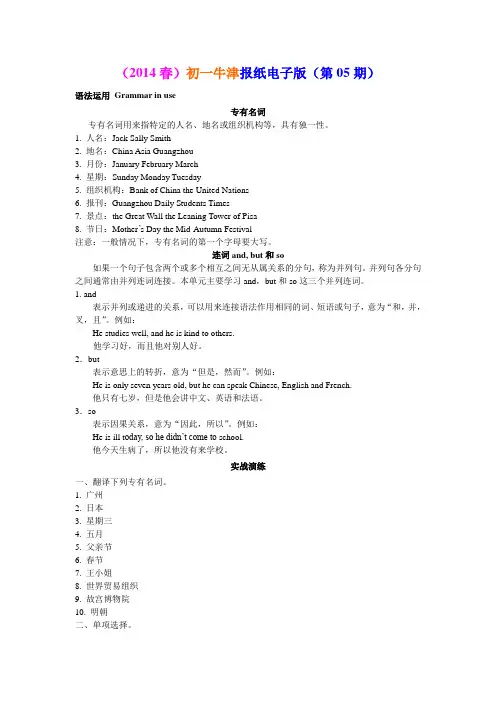
(2014春)初一牛津报纸电子版(第05期)语法运用Grammar in use专有名词专有名词用来指特定的人名、地名或组织机构等,具有独一性。
1. 人名:Jack Sally Smith2. 地名:China Asia Guangzhou3. 月份:January February March4. 星期:Sunday Monday Tuesday5. 组织机构:Bank of China the United Nations6. 报刊:Guangzhou Daily Students Times7. 景点:the Great Wall the Leaning Tower of Pisa8. 节日:Mother’s Day the Mid-Autumn Festival注意:一般情况下,专有名词的第一个字母要大写。
连词and, but和so如果一个句子包含两个或多个相互之间无从属关系的分句,称为并列句。
并列句各分句之间通常由并列连词连接。
本单元主要学习and,but和so这三个并列连词。
1. and表示并列或递进的关系,可以用来连接语法作用相同的词、短语或句子,意为“和,并,叉,且”。
例如:He studies well, and he is kind to others.他学习好,而且他对别人好。
2.but表示意思上的转折,意为“但是,然而”。
例如:He is only seven years old, but he can speak Chinese, English and French.他只有七岁,但是他会讲中文、英语和法语。
3.so表示因果关系,意为“因此,所以”。
例如:He is ill t oday, so he didn’t come to school.他今天生病了,所以他没有来学校。
实战演练一、翻译下列专有名词。
1. 广州___________________2. 日本____________________3. 星期三__________________4. 五月____________________5. 父亲节__________________6. 春节____________________7. 王小姐__________________8. 世界贸易组织____________________9. 故宫博物院_____________________10. 明朝___________________________二、单项选择。
2021-2022学年学英语报七年级第15期答案外研版基础版
1. background n背景 2. backward(3) ad. 向后 3. bacterium (复bacteria)n.细菌 4. baggage n行李 5. balance平衡 6. balloon n气球 7. bank n岸;堤 n银行 8. bank account n银行账户 9. barbecue B. 烤肉野餐 10. bargain n (经讨价还价后) 成交的商品: 廉价货电讨价还价 11. battery n. 电池 12. battle n战斗:战役 13. beach n. 海滨,海滩 14. behave v. 守规矩,行为 15. behaviour n行为,毕止 16. beneficial a 有利的,有帮助的,有用的 17. benefit n./v.优势益处,使..受益 18. bite (bit, bitten)v.咬;叮 19. biter有苦味的:痛苦的。难过的:严酷的 20. block n大块: (木、 石等)块:街区;路障 vt阻塞,阻挡 21. bored a (对人,事)厌倦的,烦闷的 22. boring a乏味的,无聊的 23. brain n脑(子) 24. branch n树枝;分公司,分店;支部 25. bravery n. 勇
(2014秋)七年级报纸电子版·牛津深圳版(第02期)
(2014秋)初一牛津报纸电子版(第02期)语法运用Grammar in use特殊疑问句的用法一、特殊疑问句的含义:以特殊疑问词开头,对句中某一成分提问的句子叫特殊疑问句。
常用的特殊疑问词有: who, which, where, when, what time, what, how many, how much, how old, why等。
二、特殊疑问句的构成:特殊疑问词+一般疑问句+?例如:1. What is your name? 你的名字叫什么?2. Where are you from? 你来自哪里?3. When do you usually get up? 你平时什么时候起床?三、特殊疑问句的基本用法:1. who: 一般用于对人称的提问。
例如: Who is your brother? 你的哥哥是谁?2. where: 一般用于对地点提问。
例如: Where are the apples? 这些苹果在哪里?3. when, what time: 一般用于对时间的提问。
例如: What time is it? 现在几点了?When are you going to Beijing? 你什么时候去北京?4. what: 一般是对人的职业或者事物是什么进行提问。
例如:What does your sister do? 你的姐姐是做什么的?What do you like to do on Sundays? 你星期天喜欢做什么?5. (1) how many: 一般用于对(可数名词的)数量提问。
例如:How many pencils are there in the box? 盒子里有多少支铅笔?(2) how much: 一般用于对(不可数名词的)数量提问。
例如:How much water is there in the bottle? 瓶子里有多少水?注: 用how much, how many提问时, 名词紧跟在其后。
学生双语报2012-2013学年下学期七年级N深版第15期听力原文及测试题答案
第15期B2版Keys:阅读训练营1-5 ADBCD 6-10 BCDDB完形小测1-5 CAADD 6-10 CBACD第15期B1B4版Keys: (One possible version)词语狙击1. patient2. apologize3. complete4. height5. replied6. experiments7. digging8. Oxygen9. programmes 10. address 11. examples 12. against 13. climb 14. valuable 15. test 16. chemicals 17. ordinary18. knowledge 19. narrow 20. support 21. successful22. cares 23. European 24. finally 25. discussion 26. harmful 27. disappeared 28. feelings 29. lively30. furniture 31. arrived at 32. give up33. was worried about 34. millions of 35. fell asleep36. looked around 37. to make fun of 38. used to39. in a way 40. is famous for 41. to take care of42. turned off 43. are made of 44. add; to 45. in the future句型演练1. What does; look2. why don’t3. not only; but also4. too old to5. At last6. be quiet7. Don’t lock8. Did; use to 9. What is; doing10. How lovely and beautiful 11. are; full of12. It took; to build 13. With the help14. you’d better stay 15. is strict about16. was different from 17. time for; to18. Playing; is; to relax 19. see; hurry to20. do your best玩转语法1. in the bottle2. on the table3. behind the door4. beside the tree5. between two schools6. on Friday afternoon7. in August8. too much milk9. enough potatoes 10. too few desks 11. the; /12. a; the 13. an 14. The 15. an 16. when 17. so 18. but 19. and; when 20. When 21. are coming22. goes; went 23.isn’t crying; is picking24. used; watches 25. preferred 26. What a 27. How28. How 29. What 30. How 31. themselves32. yourselves 33. myself 34. herself 35. himself36. on; in 37. on 38. to 39. in; on 40. in七年级(下)Units1-8 期末测试题听力原文及参考答案听力原文I. 听录音,选出你听到的句子。
(2014春)七年级报纸电子版·牛津深圳版(第24期)
(2014春)七年级报纸电⼦版·⽜津深圳版(第24期)(2014春)初⼀⽜津报纸电⼦版(第24期)综合知识专练( For Unit 5-6)词语狙击Vocabularyn. drop, journey, quantity, experiment, salt, voice, chemical, pipe, bit, bank, change, electricity, conversation, rule; wire, moment, battery, cooker, fridgev. drop, add, return, form, continue, reply, connect, lock, test, tidy, touchadj. fresh, valuable, foolishadv. onpron. anyoneprep. through1. turn off2. add ... to ...3. a bit4. part of5. pocket money6. be made up of7. dry up8. a packet of9. in a way 10. (be) connected to 11. power station12. washing machine 13. switch off 14. tidy up 15. air conditioner 16. have a shower 17. instead of 18. make sure 19. start a fire 20. safety tips完璧归赵根据句意及⾸字母提⽰填写单词, 使句⼦完整、通顺。
1. The TV is o_______. Please help me switch it off.2. We plan to go to Harbin by air because it’s a long j________ by train.3. Lily works as a hostess in a TV station because she has a sweet v______ and she’s talkative.4. This gold ring is very v_______ and it costs lots of money.5. I’m afraid we can’t go t_______ the forest. We don’t know the way.6. After you finish reading these books, please r_______ them to the library.7. Don’t t_________ these plates. They are made of glass and they are easy to break.8. My family has a lot of home r________, and each of us in my family needs to follow.9. The house is clean and t________. There’s no rubbish on the ground.10. A______ who breaks the law should be sent into prison(监狱)中西合璧根据句意及汉语提⽰填写单词, 使句⼦完整、通顺。
- 1、下载文档前请自行甄别文档内容的完整性,平台不提供额外的编辑、内容补充、找答案等附加服务。
- 2、"仅部分预览"的文档,不可在线预览部分如存在完整性等问题,可反馈申请退款(可完整预览的文档不适用该条件!)。
- 3、如文档侵犯您的权益,请联系客服反馈,我们会尽快为您处理(人工客服工作时间:9:00-18:30)。
七年级(上) 期中测试题听力部分(15分)I. 听句子,根据所听内容选择最佳应答句。
句子念两遍。
(共3小题,每小题1分)()1. A. Summer.B. Thank you.C. It is OK.()2. A. It is interesting.B. It is yellow.C. They are boxes.()3. A. He is tall.B. He is friendly.C. He likes China.II. 听对话,根据对话内容选择最佳答案。
对话念两遍。
(共4小题,每小题1分)听第一段对话,回答第4-5小题。
()4. Why is Ann so happy?A. Because she meets Sam.B. Because she has a new friend.C. Because she has long hair.()5. What does Sam think of Mary?A. Lovely.B. Funny.C. Kind.听第二段对话,回答第6-7小题。
()6. Where is David from?A. England.B. America.C. Canada.()7. How many ways does David talk about to protect the Earth?A. One.B. Two.C. Three.III. 听短文,根据所听内容选择最佳答案。
短文念两遍。
(共3小题,每小题1分)()8. What does David like doing?A. Watching TV.B. Playing computer games.C. Writing a diary.()9. Where does David often go to read English stories after class?A. The bookshop.B. The library.C. His teacher’s home.()10. What do you think of David?A. He is a funny boy.B. He is a hard-working student.C. He is a good-looking student.IV. 听短文,根据所听内容补全下列小短文。
短文念两遍。
(共5小题,每空1分)Hello! My name is Samuel. I’m 13. I’m a student in No. 1 Middle School. I get up at 7:00 a.m. and have breakfast (11) __________ Then I go to school (12) __________ at 7:40 a.m. My school is very beautiful. At 8:00 a.m., I have a Chinese class. At 5:00 in the afternoon I (13) __________.I go home at 5:30 p.m. At 6:30 in the evening I have dinner (14) __________. At 8:00 p.m., I domy homework. I often do my homework (15) __________. Then I go to bed.笔试部分(85分)I.词汇测试。
(15分)i)从下面每小题的A、B、C三个选项中选出可以替换划线部分的最佳选项。
(共8小题,每小题1分)()1. —He’s a friendly man, right?—Yes. We all like to talk with him.A. busyB. usualC. kind()2. — The rubbish pollutes this river.—Let’s move it away.A. makes …dirtyB. makes ... cleanC. makes ... popular()3. — How’s your daily life?—I’m really busy. I hope to have a long holiday.A. interestingB. everydayC. happy()4. — When can the noise in the room end? I can’t sleep.—You need to wait for thirty minutes.A. beginB. stopC. rise()5. — We always have a good time when we go camping.—Could I go with you next time?A. have funB. take a breakC. like running()6. — Is your home close to your school?—No, it isn’t. I usually spend more than half an hour going to school every morning.A. far fromB. next toC. near()7. — Take a break. I am too tired.—OK. Let’s drink some water and eat something.A. walkB. restC. trip()8. — The Earth provides us with lots of useful things.—We should protect it.A. givesB. sendsC. buysii)根据句子意思,从下面每小题的A、B、C三个选项中选出恰当的词语完成句子。
(共7 小题,每小题1分)()9. If you_________ things, you set them on fire.A. catchB. makeC. bum()10. A _________ is a thing you like to do very much in your free time.A. dreamB. hobbyC. guitar()11. —Don’t_________ the door, or it will fall down.—Sorry. I won’t.A. kickB. getC. buy()12. — If you want to play basketball well, you have to do much_________.—OK, I will.A. energyB. pollutionC. practice()13. — It’s_________. Let’s go out to make snowmen.—It must be very interesting.A. rainyB. snowyC. windy()14. — What subject are you _________?—Maths. So I often help others with it.A. good atB. good forC. bad for()15. — Do you want to_________ an after-class activity?—Yes, I do. I like doing activities very much.A.look forB. throw awayC. take part inII.完形填空。
(I5分)阅读下面短文,从短文后所给的A、B、C三个选项中选出能填入相应空白处的最佳选项。
(共10小题,每小题1.5分)One day, Mr Smith goes to a dinner party. He wears very 16 clothes. He comes into the room. But people in the room don’t 17 him. They don’t ask him to sit at the table. He isn’t 18. But he says nothing.Mr Smith goes home 19 and puts on his best clothes. He goes back to the 20. Everyone in the room stands up and looks at him. They give him good food to 21. Mr Smith takes off his coat and puts it on the 22 and says, “Eat, coat!”The other people are 23 and ask, "What are you doing? Why do you do that?” Mr Smith answers,“I 24 my coat to eat food. When I wear old clothes, you don’t look at me. You don’t ask me to sit down. Now I am wearing these nice clothes. And you 25 me good food. Now I see, you give the food to my coat, not to me.”()16. A. new B. old C. popular()17. A. look at B. look for C. look after()18. A. sad B. careful C. happy()19. A. slowly B. worriedly C. quickly()20. A. meeting B. work C. party()21. A. eat B. keep C. make()22. A. wall B. food C. ground()23. A. excited B. angry C. surprised()24. A. answer B. ask C. talk()25. A. cook B. give C. buyIII.阅读理解。
(30分)阅读下列短文,从下面每小题的A、B、C、D四个选项中选出最佳选项。
